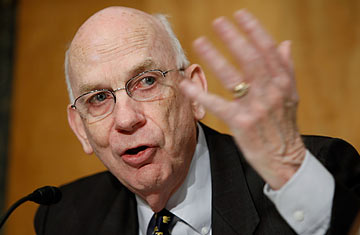
Republican Utah Senator Robert Bennett
When Utah's Republican Party holds its nominating convention on Saturday, the conservative insurgency could claim a significant scalp. Senator Robert Bennett, the three-term GOP stalwart, is lagging badly behind two Tea Party–fueled challengers. In a recent Salt Lake Tribune survey, Bennett garnered support from just 16% of state delegates, a figure eclipsed by attorney Mike Lee's 37% and entrepreneur Tim Bridgewater's 20%. Bennett's anemic polling has his antagonists clamoring at the prospect of ousting the cycle's first sitting Senator — and backers fearful that Bennett will earn the ignominious distinction of being the rare incumbent who fails even to crack his party's primary ballot.
Under Utah's peculiar primary system, the party's 3,500 state delegates — tapped by the 75,000 voters who turned out for local caucuses on March 23 — will cast secret ballots to winnow the candidate pool from eight to three, then vote again to narrow the race to two finalists. A candidate who tallies 60% of the vote would sidestep a primary and win the nomination outright; otherwise, the top pair proceeds to a June run-off. Citing his sagging status within a changing party, analysts have already penned Bennett's political obituary. "Bennett has almost no shot of getting more votes at the convention than Bridgewater and Lee," said Brad Coker, managing director of Mason-Dixon Polling & Research, the firm that conducted the Tribune survey.
Such an outcome would be the bruising fall Tea Party members have frequently predicted but so far rarely forced. But Bennett, 76, would be an unlikely victim. The son of a former Utah Senator and grandson of a former Mormon church president, Bennett has long boasted sterling conservative bona fides, and easily won re-election to his third term in 2004 with 69% of the vote. A proponent of the flat tax and opponent of abortion, he earns stellar grades from interest groups like the National Rifle Association, the American Conservative Union and the U.S. Chamber of Commerce. Yet his support for bank bailouts, his sponsorship of an alternative health-care proposal that included an individual mandate and his robust defense of earmarks are anathema to the state's swelling coterie of right-wing activists.
"The main issue was TARP and the bailout votes," says David Kirkham, the Provo-based founder of the Utah Tea Party and a state delegate at Saturday's convention. When he was nominated at a local caucus, the first question Kirkham faced was whether he backed Bennett. "I said, Absolutely not," he says. "Everybody I talk to is very anti-Bennett."
Tea Party leaders and anti-Bennett groups have cast the Senator's plight as a harbinger for Republicans who fail to court newly energized conservative voters and heed the anti-incumbent winds buffeting Washington's elite. But other analysts say that is giving the Tea Party movement too much credit. They view Bennett's potential demise as the product of the blood-red state's unique nomination system, in which a few thousand delegates have the clout to choose a U.S. Senator for a few million residents. "Utah has the highest barrier for entry onto a ballot of any state in the country," says Kirk Jowers, director of the Hinckley Institute of Politics at the University of Utah. "So the incentives are all toward kissing up to very, very few people."
